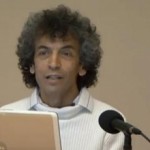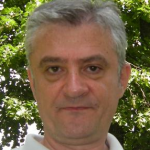Home › Forums › 2015 International Workshop on Quantum Foundations › Retrocausal theories › The too-late-choice experiment: Bell’s proof applied to a time-reversed setting
- This topic has 7 replies, 3 voices, and was last updated 8 years, 9 months ago by
 Avshalom C. Elitzur.
Avshalom C. Elitzur.
-
AuthorPosts
-
July 10, 2015 at 2:19 am #2596
 Avshalom C. ElitzurMember
Avshalom C. ElitzurMemberIn the EPR experiment, each measurement addresses the question “What is the particle’s spin value along this direction?” We propose a modified experiment where this question is reversed: “Along which direction does the particle have this spin value?” To enable that, each particle’s interaction with a beam-splitter at t1 leaves its spin direction superposed. At t2, the experimenter uses Interaction-Free Measurement to choose between the “up” or “down” outcomes regardless of the direction. By Bell’s theorem, it is now the earlier “choice” of spin direction that must be nonlocally transmitted between the particles. This lends support to time-symmetric interpretations of QM, namely the Transactional Interpretation (TI) and the Two State-Vector Formalism (TSVF). We conclude with a brief comparison between these interpretations and their traditional alternatives, Copenhagen, Bohmian mechanics and the Many Worlds Interpretation.
July 10, 2015 at 5:18 pm #2612 Mark StuckeyParticipant
Mark StuckeyParticipantI love your twist on EPRB, Avshalom. Entangling the detector direction via beam splitters and post selection is interesting. [Aside: I think you have a typo on p 5, second paragraph. Don’t you mean to “Place detectors on the remaining three ‘up’ SGM exits” instead of “the remaining three ‘down’ SGM exits” in order to complete the measurement for each particle? Also, check “Sourc” in Figure 2.]
Let me inquire concerning your view of the block universe implications of this work.
On page 1, you seem open to the block universe ontology when you characterize TI and TSVF as “novel interpretations of quantum mechanics.” Both of these interpretations explain space-like correlated outcomes that violate Bell’s inequality by allowing information about experimental outcomes (or detector settings) to be available to the entire history of the experimental process (and in some cases, beyond!). Of course, this implies the “co-reality” or “co-existence” of the past, present and future, i.e., block universe.
On page 1, you say these interpretations “render non-temporality the key for understanding QM’s other unique features.” That seems to agree with Cramer who notes that the backwards-causal elements of his theory are “only a pedagogical convention,” and that in fact “the process is atemporal” (1986, 661). But, immediately thereafter you write, “Indeed, once effects are allowed to go sometimes backwards in time, …” and on page 8 you speculate that “causal effects go on both time directions” in the quantum realm. These comments sound like you’re viewing the process in some meta-time.
What is your view of the block universe implications of these interpretations? Do you subscribe to meta-time? Or, do you view these QM processes in a block universe “non-temporally?” Or, are you considering other options?
Uncle Mark
July 11, 2015 at 7:44 am #2628 Avshalom C. ElitzurMember
Avshalom C. ElitzurMemberHere is the new version – please ignore the previous one.
July 11, 2015 at 8:26 am #2632 Avshalom C. ElitzurMember
Avshalom C. ElitzurMemberDear Mark,
Many thanks for your helpful reading, now properly acknowledged, from the silly typoes now corrected to the foundational issues, on which let’s initiate a discussion.
(BTW I didn’t succeed yet to replace the old version with the new one, so in the time being please ignore the old one and address only this version: https://ijqf.org/wp-content/uploads/2015/07/Elitzur-IJQF-paper-2.pdf)
Now to your main question. Although Cramer’s seminal 1986 paper was strongly Block-Universe, he himself has somewhat shifted towards a more daring (and admittedly more speculative) endorsement of “Becoming” – see http://arxiv.org/pdf/1503.00039. This is precisely our view: The Einstein-Minkowski spacetime is not a complete description of time! There my be another parameter (your “metatime” if you like) that allows history to be “re-written.” Yes this may entail logical loops, endless such times, etc., which is why most people don’t want to go there. But I think that this is a step worth taking. A new, fully relativistic quantum mechanics may emerge from it, rigorous and even offering new predictions.
Time will tell.
Loving regards from your niece,
AvshalomJuly 11, 2015 at 11:48 am #2634 Miroljub DugicParticipant
Miroljub DugicParticipantDear Avshalom,
i like the idea that our perception of Time may be changed. To this end, is the possibility of dynamical change of local time (separate time for single particles) viable within your approach?
Best,
Miroljub
July 12, 2015 at 8:41 pm #2669 Mark StuckeyParticipant
Mark StuckeyParticipantI hadn’t seen Cramer’s latest paper, thanks for sending it. If that paper reflects your current view on time and the Block Universe, maybe we could discuss it here? My response is rather protracted, so I’ve attached it as a pdf file here.
July 13, 2015 at 10:58 am #2682 Avshalom C. ElitzurMember
Avshalom C. ElitzurMemberMy talk in Capetown – PPT
July 13, 2015 at 11:01 am #2683 Avshalom C. ElitzurMember
Avshalom C. ElitzurMemberTrying again, compressed…
-
AuthorPosts
- You must be logged in to reply to this topic.

Comments are closed, but trackbacks and pingbacks are open.